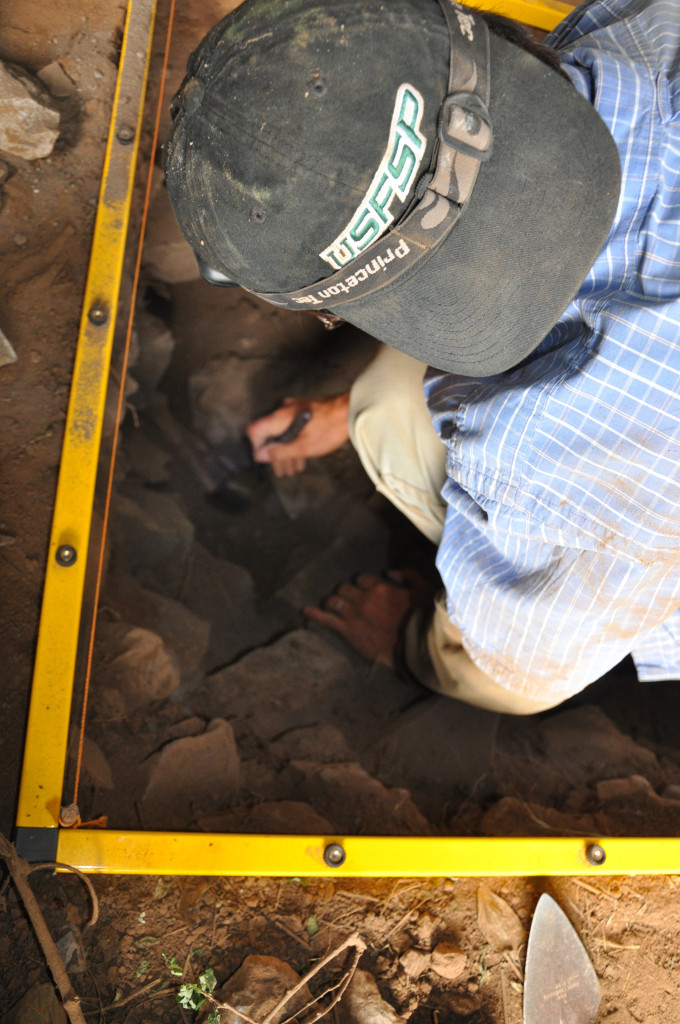
St. Petersburg, Fla. (October 8, 2015) –
An anthropology team from the University of South Florida St. Petersburg (USFSP), Drs. John and Kathryn Arthur, have announced that after several years of excavation and research in southwestern Ethiopia, their work has resulted in an enduring discovery: the first complete ancient African genome. In 2012, an ancient male human skeleton, dating back 4,500 years, was recovered from Mota Cave in the Ethiopian Gamo highlands. Ancient DNA extracted from the skeleton provides the first ancient human genome sequenced from the African continent. The prestigious journal Science published the findings online today and will publish in print tomorrow, Friday, October 9.

“This is an extraordinary discovery, a contribution to the fields of anthropology and archeology that will be recognized by scientists around the world,” said USFSP Regional Chancellor Sophia Wisniewska. “I could not be more proud of the Arthurs’ research, of their time and dedication to their field and to USF St. Petersburg.”
Gamo elders led Kathryn Arthur to Mota Cave in 2011. In 2012, John Arthur – along with Drs. Matthew Curtis of Ventura College, and Mauro Coltorti and Pierluigi Pieruccini of the University of Siena – partially excavated Mota cave and discovered the skeleton.
“We have given him the name Bayira, meaning ‘first born’ in the Gamo language in honor of the ethnic group that lives in the area today,” said John Arthur. “Bayira’s genetic sequence does not contain any West Eurasia genes, supporting the idea that more recent population movements are responsible for Eurasian admixture into modern African populations. Thus, his genome is important for understanding the out-of-Africa expansion of Homo sapiens and later population movements between Africa and Europe.”
The following period of research on the remains involved the collaboration of an international team of scientists, including Jay Stock, Ph.D. of the University of Cambridge, who conducted the skeletal morphological analysis of Bayira, and Andrea Manica, Ph.D. of the University of Cambridge and Ron Pinhasi, Ph.D. of Trinity College in Dublin, who led a team responsible for his DNA sequencing and analysis.

“Bayira long predates a migration of humans from West Eurasia into the Horn of Africa,” said Kathryn Arthur. “His DNA provides insights into prehistoric adaptation to life in the Ethiopian highlands. Bayira’s DNA contained three genetic variants, common among modern highland people, which provide adaptations to the low oxygen conditions of high altitude.”
“Bayira also allows us to begin to piece together the population history of southwestern Ethiopia, she added. “Bayira is genetically closest to the Ari ethnic group, an Omotic-speaking society living in southwestern Ethiopia today.”
The Omotic languages are linguistically the most divergent of the Afroasiatic language phylum, suggesting that Omotic speakers may have lived in southwestern Ethiopia for a long and sustained period of time. The ancient genome of Bayira supports this view, indicating that it is likely that Omotic speakers have lived in southwestern Ethiopia over the last 4,500 years.
“The significance of what John and Kathryn Arthur have discovered cannot be overstated,” said V. Mark Durand, interim Regional Vice Chancellor of Academic Affairs. “Research findings like theirs may come along just once in a lifetime.”
ABOUT USF ST. PETERSBURG
The University of South Florida St. Petersburg (USFSP) is a separately accredited, research-active institution within the USF System. USFSP offers 24 undergraduate and 13 graduate programs in three colleges: Arts and Sciences, Business, and Education. USFSP is recognized for its significant commitment to community involvement and civic engagement by the Carnegie Foundation for the Advancement of Teaching. The 2015-2016 academic year marks the 50th Anniversary for the university, which will host commemorative events throughout the year. For more information, please visit www.usfsp.edu/50years.
For more on the story and high-resolution photos, please visit www.usfsp.edu.
CONTACTS:
John W. Arthur, Ph.D.
Associate Professor, Anthropology
University of South Florida St. Petersburg
Office: 727-873-4960
arthurj@mail.usf.edu
Kathryn J.W. Arthur, Ph.D.
Associate Professor, Anthropology
University of South Florida St. Petersburg
Phone: 727-873-4858
kjarthur@mail.usf.edu
Jessica Blais
Communications Director
University of South Florida St. Petersburg
727-873-4456
jblais@mail.usf.edu
Casey Crane
Communications Officer
University of South Florida St. Petersburg
727-873-4840
ckcrane@mail.usf.edu
Matthew Curtis
matthew-curtis@sbcglobal.net
Jay Stock
jts34@cam.ac.uk

